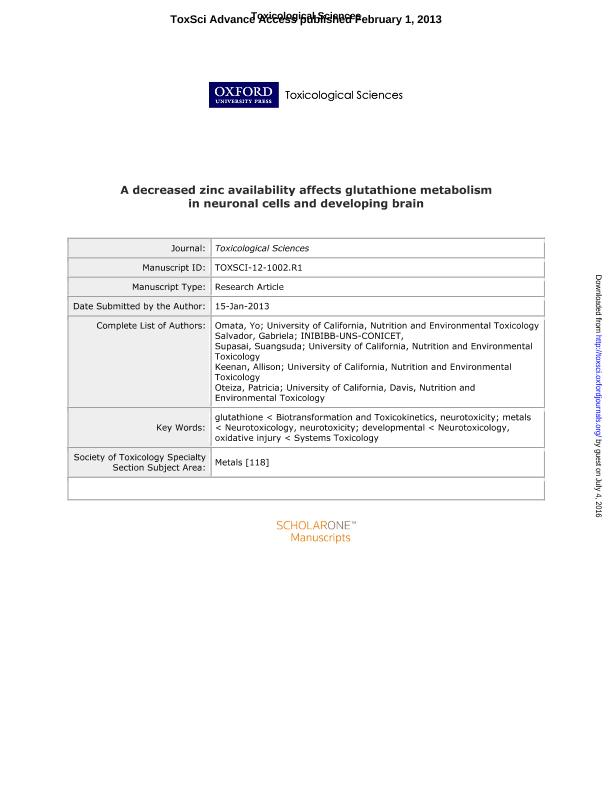Artículo
A Decreased Zinc Availability Affects Glutathione Metabolism in Neuronal Cells and in the Developing Brain
Omata, Yo; Salvador, Gabriela Alejandra ; Supasai, Suangsuda; Keenan, Allison H.; Oteiza, Patricia Isabel
; Supasai, Suangsuda; Keenan, Allison H.; Oteiza, Patricia Isabel
 ; Supasai, Suangsuda; Keenan, Allison H.; Oteiza, Patricia Isabel
; Supasai, Suangsuda; Keenan, Allison H.; Oteiza, Patricia Isabel
Fecha de publicación:
01/2013
Editorial:
Oxford University Press
Revista:
Toxicological Sciences
ISSN:
1096-6080
Idioma:
Inglés
Tipo de recurso:
Artículo publicado
Clasificación temática:
Resumen
Department of Nutrition and Department of Environmental Toxicology, University of California, Davis, California 95616. Abstract A deficit in zinc (Zn) availability can increase cell oxidant production, affect the antioxidant defense system, and trigger oxidant-sensitive signals in neuronal cells. This work tested the hypothesis that a decreased Zn availability can affect glutathione (GSH) metabolism in the developing rat brain and in neuronal cells in culture, as well as the capacity of human neuroblastoma IMR-32 cells to upregulate GSH when challenged with dopamine (DA). GSH levels were low in the brain of gestation day 19 (GD19) fetuses from dams fed marginal Zn diets throughout gestation and in Zn-deficient IMR-32 cells. γ-Glutamylcysteine synthetase (GCL), the first enzyme in the GSH synthetic pathway, was altered by Zn deficiency (ZD). The protein and mRNA levels of the GCL modifier (GCLM) and catalytic (GCLC) subunits were lower in the Zn-deficient GD19 fetal brain and in IMR-32 cells compared with controls. The nuclear translocation of transcription factor nuclear factor (erythroid-derived 2)-like 2, which controls GCL transcription, was impaired by ZD. Posttranslationally, the caspase-3-dependent GCLC cleavage was high in Zn-deficient IMR-32 cells. Cells challenged with DA showed an increase in GCLM and GCLC protein and mRNA levels and a consequent increase in GSH concentration. Although Zn-deficient cells partially upregulated GCL subunits after exposure to DA, GSH content remained low. In summary, results show that a low Zn availability affects the GSH synthetic pathway in neuronal cells and fetal brain both at transcriptional and posttranslational levels. This can in part underlie the GSH depletion associated with ZD and the high sensitivity of Zn-deficient neurons to pro-oxidative stressors.
Palabras clave:
Zinc
,
Gluthatione
,
Oxidative Stress
,
Brain
,
Dopamine
,
Neuron
Archivos asociados
Licencia
Identificadores
Colecciones
Articulos(CCT - BAHIA BLANCA)
Articulos de CTRO.CIENTIFICO TECNOL.CONICET - BAHIA BLANCA
Articulos de CTRO.CIENTIFICO TECNOL.CONICET - BAHIA BLANCA
Articulos(INIBIBB)
Articulos de INST.DE INVEST.BIOQUIMICAS BAHIA BLANCA (I)
Articulos de INST.DE INVEST.BIOQUIMICAS BAHIA BLANCA (I)
Citación
Omata, Yo; Salvador, Gabriela Alejandra; Supasai, Suangsuda; Keenan, Allison H.; Oteiza, Patricia Isabel; A Decreased Zinc Availability Affects Glutathione Metabolism in Neuronal Cells and in the Developing Brain; Oxford University Press; Toxicological Sciences; 133; 1; 1-2013; 90-100
Compartir
Altmétricas



